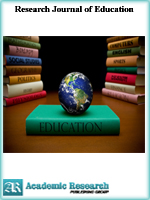Research Journal of Education
Online ISSN: 2413-0540
Print ISSN: 2413-8886
Print ISSN: 2413-8886
Quarterly Published (4 Issues Per Year)

Archives
Volume 10 Number 1 March 2024
Teachers’ Perceptions, Knowledge, and Interactions with Scripted Curriculum
Authors: Louis S. Nadelson ; Allison Freed ; Odunola Oyeniyi, et. al.
Pages: 13-29
DOI: doi.org/10.32861/rje.101.13.29
Abstract
As shortages of teachers increase and student standardized test scores remain low and unchanged, there is a push for increasing instructional effectiveness using scripted curriculum and direct instruction. However, scripted curriculum is likely inconsistent with teachers’ professional visions and needs, leading to conflicting goals for adopting scripted curriculum and teachers’ professional goals. We determined the gaps in the literature support the need to collectively explore how teachers define and consider scripted curriculum, particularly the extent to which they think the curriculum is culturally responsive, motivates students to learn, are involved in adopting the curriculum, and their preferences for teaching with scripted curriculum. Using a cross-section survey design, we gathered quantitative and qualitative data from 292 K-12 teachers working in the south-central United States. We found teachers did not perceive scripted curriculum as culturally responsive, did not think the curriculum motivates students to learn, did not like teaching with the curriculum or preferred to use it as a resource, and tended to be marginally involved in selecting the curriculum. Our research empirically documents the narrative teachers tend to share about scripted curriculum. We conclude our report by discussing our results, implications for our findings, and recommendations for future research.
Disaster Risk Reduction Education in Geography at Schools in Greece
Authors: Passadelli Anthoula Styliani ; Klonari Aikaterini ; Nikolarea Ekaterini
Pages: 1-12
DOI: doi.org/10.32861/rje.101.1.12
Abstract
In Greece, the school subject of geography is used as a tool to integrate Disaster Risk Reduction (DRR) in the national school curriculum. In order to investigate the content development of DRR in the Greek school geography curricula, this study analyzed the primary and secondary geography curricula from 2003 to 2023, using the five dimensions of the DRR learning system (knowledge, reaction , action, participation and integration) as platforms and conceptual assumptions. Qualitative content analysis indicated the following: (a) the DRR-relevant content in the geography curricula used for analysis underwent minimal changes from 2003 to 2023; (b) the changes in the DRR-relevant content in the primary and secondary school curricula presented almost identical characteristics. Therefore, should the geography curriculum be revised in the future, it is necessary to understand that the term “disaster” does not only describe the natural event per se but also its impact on and the consequences for infrastructure and society. Such revisions in the school geography curriculum are bound to add more DRR-relevant content that belongs to the “action” and “participation” dimensions, and as they should systematically incorporate the DRR-relevant content of the “integration” dimension.



